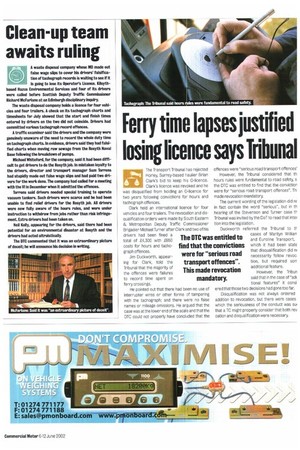Ferry time lapses justified losing licence says Tribunal
Page 19

If you've noticed an error in this article please click here to report it so we can fix it.
The Transport Tribunal has rejected Horley, Surrey-based haulier Brian Clark's bid to keep his 0-licence. Clark's licence was revoked and he was disqualified from holding an 0-licence for two years following convictions for hours and
tachograph offences.
Clark held an international licence for four vehicles and four trailers. The revocation and disqualification orders were made by South Eastern & Metropolitan Deputy Traffic Commissioner Brigadier Michael Turner after Clark and two of his drivers had been fined a total of £4,300 with £650 Costs for hours and tachograph offences.
Jim Duckworth, appearing for Clark, told the Tribunal that the majority of the offences were failures to record time spent on ferry crossings.
He pointed out that there had been no use of interrupter wires or other forms of tampering with the tachograph; and there were no false names or mileage omissions. He argued that the case was at the lower end of the scale and that the DTC could not properly have concluded that the
offences were "serious road transport offences'
However, the Tribunal considered that th hours rules were fundamental to road safety, s the DTC was entitled to find that the conviction were for "serious road transport offences". Thi made revocation mandatory.
The current wording of the legislation did m in fact contain the word "serious", but in th hearing of the Stevenson and Turner case th Tribunal was invited by the DoT to read that inter tion into the legislation.
Duckworth referred the Tribunal to a cases of Marilyn William and Euroline Transport, which it had been stat€ that disqualification did nr necessarily follow revoc. tiOn, but required SOIT additional feature.
However, the Tribun said that in the case of "ad( trona' features" it consi ered that those two decisions had gone too far.
Disqualification was not always ordered addition to revocation, but there were cases which the seriousness of the conduct was sui that a TC might properly consider that both rev cation and disqualification were necessary.




















































































































































